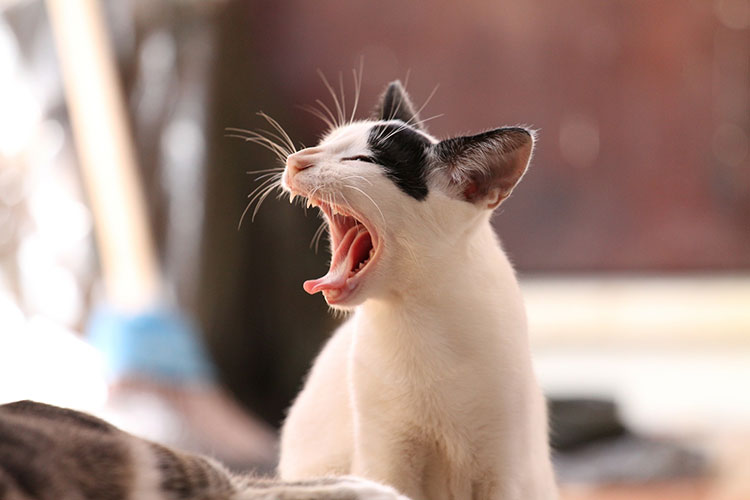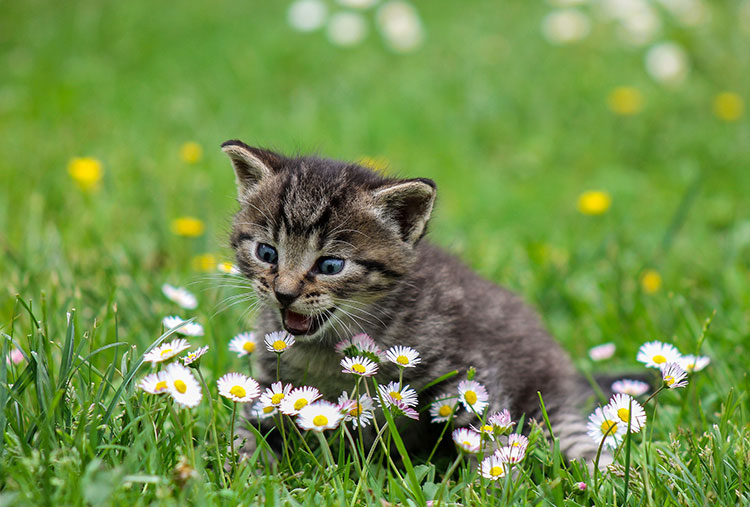Table of Contents
All creatures have their ways of communicating. Birds chirp, dogs bark, humans talk, and cats meow. If you’re living with a cat for the first time, you may be amazed at the variety of trills, mews, and growls that they use to get their point across. If your cat is vocalizing excessively, you may begin to wonder: do cats cry because something is wrong or because they’re simply talking? What are the real reasons behind cat crying?
Do Cats Cry for Attention? Sometimes.

While a cat’s eyes may not literally shed tears when they’re feeling sad, they do feel emotions just like other animals. On a side note, if you do notice your cat tearing up a lot, it’s probably best to schedule a veterinary checkup. While cat’s tear ducts can create tears, they do this for medical reasons – not because your cat is sad. Cats crying tears can be a sign of debris, a scratch on your cat’s eye, or other eye problems.
Being left alone for long periods without enough stimulation can cause any apartment pet to feel bored and lonely. This is especially true with younger cats. Loneliness can definitely cause a cat to vocalize for attention or to try to initiate play with their owners.
If you find that your cat is being too noisy when you’re not there or loudly making himself known while you’re trying to work from home, schedule a set time for play each day. This can just be in your home or with any pet-friendly amenities your landlord offers. This will stimulate your cat mentally as well as help tire him out. You should also use positive reinforcement and only interact with your cat when he’s quiet.
Is the Crying Cat a Hungry Cat?

Some cats spend their days in a never-ending attempt to convince everyone that they’re starving. If your cat cries every time someone walks by in hopes of them filling her cat food bowl, you’re going to have to enact some tough love to break this annoying habit.
First: if everyone has been feeding your cat every time she meows, this must stop immediately. Feed her only at set times of the day. If your schedule doesn’t always allow you to be home when it’s kitty feeding time, invest in an automatic feeder that will do the job for you. Eventually, your cat will get accustomed to eating at specific times and will stop vocally harassing everyone in the house for kibbles or cans of food.
Is It Trying to Send a Message?
A cat may also cry if it’s trying to tell you something important. Your feline may wail if they’ve been shut in a cabinet or trapped in a room without their litter box. They might meow incessantly if their water bowl is empty, if their favorite toy is trapped deep underneath the couch, or if they spot a tempting bug crawling across the ceiling. Some cats will jump up next to the sink and meow until someone turns on a trickle of water for them to drink or play with.
Cats also often meow as a matter of coming and going. They may give a pleasant kitty hi to you, talking and rubbing around your legs, when you first return home from work. If you have an indoor-outdoor cat, she may also cry to let you know when she wants to go out or come back inside.
Kitties will also often vocalize if they’re stressed out. This might be caused by a move to a new environment, a car ride, or arriving at the veterinarian’s office. Cats are also notorious for loudly meowing, growling, and hissing if a new cat or dog is brought into the house. (When introducing new pets to each other, it’s best to let them investigate each other through the crack in the bottom of a closed door so as to avoid excess stress.)
When Cat Crying is Serious

If your typically-quiet cat has suddenly started with excessive meowing, it’s important to pay attention to determine the cause. This is because unusually excessive vocalization can be a sign of numerous diseases in cats.
An increase in meowing may be a symptom of cognitive dysfunction, particularly in senior cats. Just like aging humans, an older cat may have trouble remembering how to find their way around and their vision may begin to fail.
Cat crying can also be a sign of illnesses such as kidney disease. Like cognitive dysfunction, kidney disease is very common in aging cats. An overactive thyroid can also cause excessive cat talk.
Next to “Do dogs smile?”, asking “Why do cats cry?” is one of the great pet questions of all time. While your furry friend may be talking for many reasons, it’s highly recommended to take a crying cat to the vet to rule to any underlying health issues before making assumptions.

